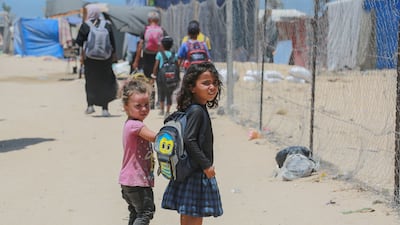Live updates: Follow the latest news on Israel-Gaza
At least 8,572 Palestinian pupils have been killed in Gaza and 100 in the occupied West Bank since Israel began its war on Gaza, the Wafa news agency reported, quoting the Palestinian Education Ministry in the West Bank.
The ministry said that at least 497 teachers and administrators were killed and 3,402 wounded in both Palestinian territories.
Since the war on Gaza started on October 7, the Israeli army has either destroyed or damaged every university in the strip with air strikes or controlled demolition, according to Palestinian news agency Wafa.
According to earlier UN figures, about 75 per cent of the enclave’s education infrastructure had been damaged by early January.
Sigrid Kaag, the UN humanitarian co-ordinator for Gaza, told the Security Council that 1.9 million people – 80 per cent of the population – were now displaced.
“Over one million people have been displaced once again, desperately seeking shelter and safety [and] 1.9 million people are now displaced across Gaza … I'm deeply concerned about reports of new evacuation orders issued in the area of Khan Younis,” Ms Kaag said.
“Palestinian civilians in Gaza have been plunged into an abyss of suffering, their homes life shattered, their lives upended. The war has not merely created the most profound of humanitarian crises. It has unleashed a maelstrom of human misery,” she added.
The latest toll comes as heavy Israeli bombardment killed at least 10 people and injured dozens in southern Gaza after the military ordered civilians to leave eastern areas of Khan Younis and Rafah.
Hundreds of people began leaving densely populated areas in and around Khan Younis city overnight on Monday after being told to move west immediately to a designated “humanitarian zone” along Gaza's coast. Large numbers left the eastern and southern areas and heading towards the centre and west of the city. Some slept on the streets as they had no place to go.

Ahmad Al Buraim, from east of Khan Younis, spent his night on the street. He fled more than seven times since the war started in early October, and says he has nowhere to go.
“We don’t know where to go, where to take the children and women, no one cares about us” Mr Al Buraim told The National.
The UN agency for Palestinian refugees (UNRWA) condemned the latest Israeli evacuation order, saying about 250,000 people will have to flee Khan Younis “even though nowhere is safe in Gaza”.
“Just weeks after people were forced to return to a devastated Khan Younis, Israeli authorities have issued new evacuation orders for the area. Yet again, families face forced displacement,” it said on X.
The Israeli army on Tuesday said about 15 rockets have been fired at Kiryat Shmona and the city's surrounding areas.
Ten of the rockets were intercepted while no casualties were reported from the other five other strikes.
Kiryat Shmona is a city of about 22,500 people in Israel's Northern District, in the Hula Valley near the Lebanese border.
Hezbollah claimed responsibility for the barrage, saying it was in retaliation for an Israeli attack that killed a civilian that day.
The deputy leader of the Lebanese group had told the Associated Press news agency that the only sure path to a ceasefire on the Lebanon-Israel border is a full truce in Gaza.
“If there is a ceasefire in Gaza, we will stop without any discussion,” Hezbollah’s deputy leader, Sheikh Naim Kassem, said.
Hezbollah’s participation in the Israel-Hamas war has been as a “support front” for its ally, Hamas, Kassem said, and “if the war stops, this military support will no longer exist” he said.

